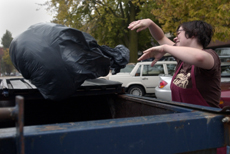Litter leaves campus in a messy situation

Online Poster
October 20, 2004
Beer bottles, paper plates and newspapers litter the ground – all evidence of the trashy truth. Trash abounds on campus, and encountering litter is a part of everyday life for students.
“I see the occasional newspapers on the ground and garbage around the frat houses, especially on the weekends,” said Darek Kawamoto, freshman in engineering.
According to the Web site for Educational Partnership, an organization working toward waste reduction, the average college student produces 640 pounds of solid waste each year, including 500 disposable cups and 320 pounds of paper. A recent finding from The Earth Works Group Recyclers shows the amount of garbage accumulated on a college campus does not coincide with the amount of room left to store it in landfills.
In addition, the study claimed that if the amount of garbage produced each year increased, there would be nowhere to store it because of decreasing open space in landfills.
Denny Brown, garbage services coordinator for Champaign’s Central Waste Services, explained that the process of garbage pick-up in Champaign begins when residential waste is collected through route trucks and then sent to the transfer station in Urbana. Afterward, it is shipped off into semi-trailers and finally taken to a landfill in Danville, Ill. Brown said the garbage-collecting process is simple, but having a major college campus in the middle of Champaign complicates things.
Get The Daily Illini in your inbox!
“It makes the months of May and August when move-ins and move-outs occur very difficult on our waste removal process,” he said.
Eric Meyers, manager of the Champaign bar Kam’s, 618 E. Daniel St., said renovations can also complicate the garbage removal process.
He explained that ever since the Illini Union Bookstore remodeled and expanded, storage of garbage at neighboring businesses has been problematic. Prior to the bookstore expansion, businesses such as Kam’s, Silver Mine Subs and Subway had a back area with dumpsters to store trash.
When the bookstore expanded, it took the dumpsters with them. Garbage has to be stored in roll-away “toters” that are taken to the front area of businesses each night to be picked up by waste services the next morning. Meyers said this causes problems, including crowding the sidewalk as well as creating an unwelcoming environment.
“Garbage should be cleaned up in order to create an excellent college atmosphere,” Kawamoto said.
The University’s Waste Transfer & Recycling Division helps to ease the garbage issue on campus by providing students with free and up-to-date recycling programs.
Tim Hoss, director of recycling on campus, said the garbage issue lies in the hands of the students. He explained that the key to reducing waste on campus is “more participation in recycling.”
“Seeing paper in the regular garbage is a problem,” he said.
Hoss also said students should exercise their right to recycle, and student organizations such as Students for Environmental Change have already begun to do just that.
“Our group’s mission is to promote environmental consciousness among the campus and the local community and to work toward environmental change,” said Ashley Peterson, president of the group.
In addition to making efforts with fraternities and sororities around campus to reduce their amount of waste, Peterson said members of Students for Environmental Change work with a new student project, adopt-a-campus pathway, headed by junior in ACES Paul Holze.
“The project is involved in promoting other registered organizations to help maintain a clean campus by designating different areas around campus for groups to clean up litter,” Holze said.
“Picking up after other people is hard and because of that, we should start picking up after ourselves,” Kawamoto said.






